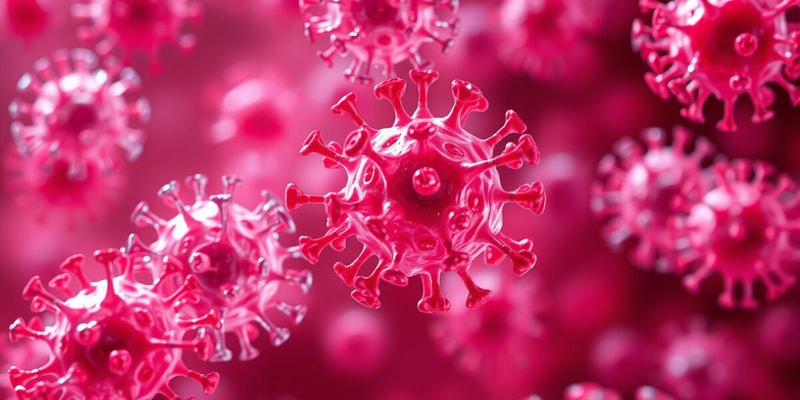Questions and Answers
What type of immune response is characterized by being immediate and nonspecific?
Which T cell subset primarily binds to MHC class II molecules?
What is the primary function of Major Histocompatibility Complex (MHC) molecules?
Which of the following proteins is encoded by MHC class I genes?
Signup and view all the answers
What is a significant role of the human leukocyte antigens (HLA) in the body?
Signup and view all the answers
Which cells lack MHC class I molecules?
Signup and view all the answers
Which of the following groups of genes encodes the MHC class II molecules?
Signup and view all the answers
How do T cells recognize antigens?
Signup and view all the answers
What type of immune cells interact with MHC class I molecules to recognize foreign peptides?
Signup and view all the answers
What is the primary function of Transporters of Antigenic Peptides (TAP) in the context of MHC class I molecules?
Signup and view all the answers
Which structure serves to stabilize the MHC class I molecule between the alpha 1, alpha 2, and alpha 3 domains?
Signup and view all the answers
In which cellular process does the MHC class II molecule present antigens?
Signup and view all the answers
How long are the peptides typically bound by the MHC class II molecule?
Signup and view all the answers
What molecule temporarily occupies the binding groove of the MHC class II molecule during its synthesis?
Signup and view all the answers
What happens to a cell when cytotoxic T cells recognize a foreign peptide presented by MHC class I?
Signup and view all the answers
Where does the degradation of proteins into peptide chains primarily take place for MHC class I presentation?
Signup and view all the answers
Which immune cells primarily present antigens to CD4+ T helper cells?
Signup and view all the answers
What is the fate of the MHC class I molecule after it has bound a peptide in the endoplasmic reticulum?
Signup and view all the answers
Study Notes
Immune System Overview
- The immune system consists of two responses: innate (immediate, nonspecific) and adaptive (delayed, specific).
- Adaptive immune response utilizes unique B cells and T cells targeting specific pathogens through antigens.
T Cells and MHC Molecules
- T cells bind short peptides known as antigens displayed on Major Histocompatibility Complex (MHC) molecules, analogous to a "silver platter."
- MHC molecules are also referred to as human leukocyte antigens (HLA), encoded by MHC genes located on chromosome 6.
MHC Gene Groups
- Two groups of MHC genes:
-
MHC Class I molecules (CD8 molecule on cytotoxic T cells):
- Proteins: HLA-A, HLA-B, HLA-C (1 letter each to remember).
-
MHC Class II molecules (CD4 molecule on helper T cells):
- Proteins: HLA-DP, HLA-DQ, HLA-DR (2 letters each to remember).
-
MHC Class I molecules (CD8 molecule on cytotoxic T cells):
Role in Transplantation and T Cell Recognition
- MHC genes are crucial for transplant compatibility and ensure T cells effectively recognize and respond to antigens.
- HLA proteins are present not only in leukocytes but also on all nucleated cells, excluding mature erythrocytes.
Structure of MHC Class I Molecules
- Comprised of two protein chains: alpha chain (with peptide binding groove) and beta-2-microglobulin.
- Alpha chain features three extracellular domains: alpha 1, alpha 2, alpha 3. The peptide groove is formed by alpha 1 and alpha 2.
- Capable of binding peptides roughly 8-10 amino acids long, with hydrophobic residues aligning to hydrophilic binding sites.
Antigen Presentation Pathways
-
Endogenous pathway utilized by MHC Class I:
- Involves degradation of cellular proteins in the proteasome and transport of peptides through Transporters of Antigenic Peptides (TAP) into the endoplasmic reticulum.
- Peptides are loaded onto MHC Class I molecules and transported to the cell surface.
-
Exogenous pathway utilized by MHC Class II:
- Starts with ingestion of pathogens by antigen-presenting cells, forming a phagosome filled with degrading enzymes.
- MHC Class II molecules initially filled with invariant chain during synthesis, later replaced by peptides from the phagolysosome.
Function of MHC Class I and Class II
- MHC Class I molecules present endogenous antigens (from within the cell) to cytotoxic T cells.
- MHC Class II molecules present exogenous antigens (from outside) to helper T cells, activating the immune response.
Mechanism of Immune Surveillance
- This system allows immune cells to continuously sample and monitor cellular proteins, leading to early detection of viral infections or abnormal proteins in cancer cells.
Studying That Suits You
Use AI to generate personalized quizzes and flashcards to suit your learning preferences.
Description
Explore the fundamental aspects of the immune system, focusing on the roles of T cells within the innate and adaptive immune responses. This quiz will cover how T cells interact with antigens and the significance of Major Histocompatibility Complex (MHC) molecules in immune response.




